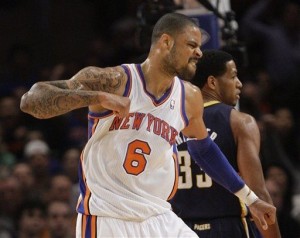 On Tuesday, November 5, the New York Knicks suffered a major blow to its title aspirations when center Tyson Chandler went down with an apparent knee injury. Frank Isola of The New York Daily News reports that X-Rays on the knee were inconclusive, and the Knicks are now calling a knee sprain the, “Best case scenario.”
On Tuesday, November 5, the New York Knicks suffered a major blow to its title aspirations when center Tyson Chandler went down with an apparent knee injury. Frank Isola of The New York Daily News reports that X-Rays on the knee were inconclusive, and the Knicks are now calling a knee sprain the, “Best case scenario.”
As harsh as it may sound, Chandler’s health will decide the outcome of New York’s season.
Chandler won the 2011-12 NBA Defensive Player of the Year award after helping to transform the culture of the Knicks as an organization. In 2012-13, he anchored a defensive-minded contender that won 54 games. New York hadn’t won 50 since 2000.
Unfortunately, a recent string of knee injuries to stars such as Derrick Rose, Rajon Rondo and Russell Westbrook have put the severity of Chandler’s situation into perspective. As Rondo and Westbrook’s lack of luck has displayed, even ailments that seem to be limited to soreness or a sprain can escalate into a season-ending injury.
Furthermore, Chandler missed 16 regular season games and was limited throughout the postseason due to injuries in 2012-13. Even if he does make a full recovery, an early-season injury spells trouble for a team that cannot afford to lose his impact.
Without Chandler, the Knicks are an entirely different team. That’s why this injury is so important to monitor.
With, Without
Since serving as the defensive anchor of the 2011 NBA champion Dallas Mavericks, Chandler has become one of the most respected interior defenders in the world. Even when his numbers aren’t flashy, he impacts the game around the basket and forces the opposition to rely heavily upon the least efficient shots in basketball: mid-range and three-point jumpers.
Plain and simple, Chandler has been the difference between winning and losing for New York.
Since acquiring Chandler, the Knicks are 91-61 in 152 total regular season games. In the two years before signing the former No. 2 overall draft choice, the Knicks went 71-93.
There’s a reason for that turnaround, and it starts on defense.
During the 2012-13 regular season, the Knicks averaged 101.7 points scored and 95.5 points allowed per 48 minutes when Chandler was on the floor. When he hit the bench, those numbers dropped to 95.5 points scored and 96.0 points allowed per 48.
That’s a drop-off from a 6.2-point advantage to a 0.5-point disadvantage—a stunning swing of 6.7 points.
The true damage is done on the glass, where the Knicks average 42.7 total rebounds and 12.3 offensive boards per 48 minutes when Chandler is playing. When he’s off of the court, those numbers take a steep hit and fall to 37.8 overall and 8.6 offensively.
For a Knicks team that posted a negative rebound differential in 2012-13, they need Chandler to play in as many games as possible to prevent that from happening again.
Championship hopes? Without Chandler, I’d expect Knicks to remain out of the playoff scene.
Lets see if Dolan panics when he sees Nets dominating the positive headlines, and does something like trade away Shumpert and more picks.